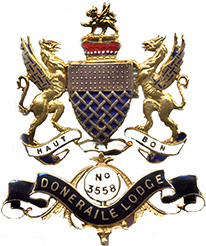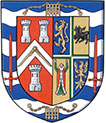Doneraile Lodge was consecrated on 3rd October 1912 to perpetuate the memory of the Hon. Lady Elizabeth Aldworth, (1695-1775) who was initiated into Lodge No. 44 at Doneraile Court, Co. Cork in Ireland in 1712 and was later installed as Worshipful Master.
On 3rd October 1912, The R.W. Viscount Doneraile. PGW (Edward St Leger, 6th Viscount Doneraile) was Installed as Worshipful Master of Doneraile Lodge 3558 at it’s Consecration at Freemasons Hall by the V.W. Bro. Sir Edward Letchworth. F.S.A. Grand Secretary. The title Doneraile was originally pronounced 'Dunnaral'. However, over time it has changed and is now is pronounced ‘Don-ner-rail’ in Doneraile Lodge 3558.
There are various stories about women in Freemasonry (Not to be confused with the Women’s Freemasonry of today), but the Craft as we know it, a male fraternity. Doneraile Lodge is unique in that it has true connections to a Lodge that had a woman as its Worshipful Master.
Let me tell you the legend of how Miss St. Leger became a member of the Craft.
It appears that the first Viscount (of the creation) Doneraile was a most zealous member of the Masonic Brotherhood, and held a Warrant, under authority of which he was privileged to open a lodge at Doneraile House, in County Cork, Ireland.
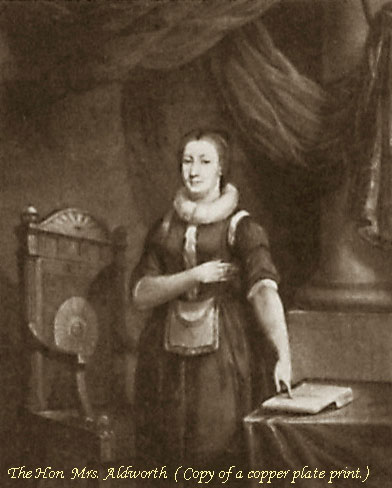 It so happened that on an occasion, when some repairs and alterations were being made in the room in which the lodge was usually held, that the wall at one place had been knocked down, and only temporarily rebuilt with loose bricks. There was a room on the other side of this wall, whose entrance was close to the door which opened into the lodge-room, and in this room it happened that the daughter of the house, Mistress Betty St. Leger, found herself by accident on the evening in question. Whether she had lain down for a rest on one of the loungers, or had become interested in reading, the writer knows not, but, at any rate, she awoke to the fact that something mysterious was going on in the next room. By this time twilight had set in, and she perceived a ray of light falling through a crevice where the loose bricks were piled up. Being a daughter of Eve, who will blame her, when we repeat that she stole up to where the tell- tale ray escaped, and beheld a scene never before beheld by a woman, a scene which it is not lawful to describe. Having sufficiently satisfied her curiosity, a certain feeling of dread took possession of her, and she determined to leave the place of her espionage with all possible expedition, lest she should be discovered.
It so happened that on an occasion, when some repairs and alterations were being made in the room in which the lodge was usually held, that the wall at one place had been knocked down, and only temporarily rebuilt with loose bricks. There was a room on the other side of this wall, whose entrance was close to the door which opened into the lodge-room, and in this room it happened that the daughter of the house, Mistress Betty St. Leger, found herself by accident on the evening in question. Whether she had lain down for a rest on one of the loungers, or had become interested in reading, the writer knows not, but, at any rate, she awoke to the fact that something mysterious was going on in the next room. By this time twilight had set in, and she perceived a ray of light falling through a crevice where the loose bricks were piled up. Being a daughter of Eve, who will blame her, when we repeat that she stole up to where the tell- tale ray escaped, and beheld a scene never before beheld by a woman, a scene which it is not lawful to describe. Having sufficiently satisfied her curiosity, a certain feeling of dread took possession of her, and she determined to leave the place of her espionage with all possible expedition, lest she should be discovered.
She stole to the door of the room, opened it gently, and stealthily stepped into the corridor; but judge her alarm, when a man armed with a sword - the trusty Tyler who guarded the door of the lodge-room arrested her, as he judged from her manner that she had been an unprivileged witness of some of the rites. Still retaining hold of her by the arm, he drew her into the dark room from which she had just emerged, where his worst fears were confirmed, as he soon discovered the "Judas-hole" through which she had peeped.
Leading her to the lodge-room, the Tyler sounded the alarm. The inner guard comes to the threshold, and there beholds the trembling girl in the hands of her stern captors. The matter was hastily explained, and it is stated that the Brethren, in the first moments of indignation and alarm, determined to take most serious steps, but finally, moved by the earnest supplications of her young brother, Hayes, who was fortunately present, and to whom she was most dear, it was determined to spare her life on the condition of her consenting to be initiated into the Masonic mysteries, an alternative which the terrified girl gladly accepted.
Miss St. Leger, or the Hon. Mrs. Aldworth, or Lady Aldworth, as she is popularly called, lived to become a mother in Israel as far as Masonry was concerned, and to be looked upon as a beloved and venerated member of the Order, taking part in all the processions and assemblies in Cork and neighborhood until she died, which event took place in 1775; at the age of eighty years.
She was buried in the Davies' vault, beneath the old Cathedral of St. Finbarre's, Cork, and the late Dr. Richard Caulfield writes, that shortly before the erection of the present Cathedral he had an opportunity of seeing her remains. The body of the venerable lady was enclosed in a leaden shell, and was in a wonderful state of preservation. "She was attired in a dark silk dress, white satin shoes and silk stockings of a similar colour. Her person was comely; her face of a dusky or ash-colour; her features quite perfect and calm. She wore long silk gloves, which extended above the embroidered lace wristbands; her bosom was full and large for her age. She wore a white head-dress, with a frill round her neck, the plaits of which were not even ruffled".
The inscription on the stone slab, which covered the vault in which she lay, had become almost indecipherable by the passage of countless feet, so when the present cathedral was being built, it was determined to place it where it would be safe from further injury. It now forms a portion of the floor of the little chamber which is situated at the top of the great tower. The motto of the St. Leger family is "Haut et Bon," and well Elizabeth Aldworth, nee St. Leger, acted up to it. She was a high-spirited, high-principled woman, and her brethren of the Masonic Confraternity know how the tongue of good report followed her through life. Even in death the motto is appropriate. Her tomb is now in the crypt of St. Finbarre's Cathedral, surrounded by the ashes of many of those great and good men, the Bishops and Archbishops of the Church, while high in the air, in the lofty central tower, her tombstone is placed as we have seen. "HAUT ET BON". (“High and Good”)
When William 1st landed in Hastings in 1066, it is said that he leaned on the arm of a Robert St. Leger as he stepped from the boat to the shores of Sussex. Sir Robert afterwards settled at Ulcomb, in Kent, but attended King Richard 1st to the Holy Land. A descendant of his married Anne of York, Duchess of Exeter, eldest daughter of Richard Plantagenet, Duke of York, and sister of King Edward IV.
In later years a Sir Anthony St. Leger, a scion of this illustrious family, went to Ireland in 1557; and served there under three English Sovereigns. He became Lord Deputy, and was created a Knight of the Garter by Henry VIII. He was married to Agnes, daughter of Hugh Warham. He disinherited his eldest son William, and was succeeded by his second son. Sir Warham, who was married to, Miss Elizabeth Rothe, of Kilkenny. Sir Warham was appointed Lord President of Munster when that office was first established in 1567. He was afterwards killed in single combat by Hugh Maguire, Lord of Fermanagh, who was slain at the same time. He was succeeded by his eldest son, William, who was married to Gertrude de Vrieg.
Sir William died 2nd July, 1642, and was succeeded by his eldest son, Sir William St. Leger, M.P., who was killed at the battle of Newburg, in 1644. He was succeeded by his brother John, of Doneraile (who was married to Mary Dorcas, only daughter of Arthur, Earl of Donegal, and had two sons, Arthur and John) who was afterwards Baron of Exchequer in Ireland. Arthur married, on 24th January, 1690, Elizabeth, daughter and heiress of John Hayes, Esq., M.P. for Winchelsea, in Sussex, and had issue three sons, Arthur, John (who was killed in a duel in 1741) and Hayes; also, one daughter Elizabeth, who is the subject of the present article, Arthur St. Leger, of Doneraile, in Ireland, and Eggisford, in Devon, was created by Queen Anne, in 1705, Baron Kilmagdow and Viscount Doneraile. He died in 1727, and was succeeded by his eldest son, Arthur, who had been married in June, 1717; to Mary, only daughter of Lord Mohun.
He had one son, Arthur Mohun, born 7th August, 1716, who succeeded as third Viscount, and who although married twice, died without issue, in Lisbon, in August, in 174-9, when his estates and titles devolved upon his uncle Hayes, son of the first Lord, who succeeded as fourth Viscount. He had been married to Elizabeth, daughter of Joseph Deane, Lord Chief Baron of Exchequer; but as he also died childless, the titles became extinct, while his estates descended to his sister, the Hon. Elizabeth St. Leger, who had married Richard Aldworth, of Newmarket, Cork, and had issue two sons, Boyle and St. Leger. The second son, St. Leger Aid-worth, succeeded, on the death of his mother, to the estates of maternal ancestors, and assumed the name of St. Leger.
He had been created Baron Doneraile on 2nd July, 1776, and Viscount Doneraile, 22nd June, 1785; was married to Mary, eldest daughter of Redmond Barry, Esq. , of Ballyclough and had issue - Hayes, born 1755, and Richard, born in 1756. Hayes, who succeeded his father as second Viscount, had married Charlotte Bernard, sister of the first Earl of Bandon, and had issue - Hayes, born in 1786, who married his cousin, Lady Charlotte Esther, daughter of the first Earl of Bandon, in 1816.
Hayes, the Second Viscount, died 8th November, 1819, was succeeded by his son Hayes, the third Viscount who died March 27th, 1854; and the titles and estates devolved upon his only son Hayes, the fourth and late Viscount, born 1818, who had married in 1851, Mary Anne Grace Louisa, only daughter of G. Lennox Conynghame, by whom he had one son and two daughters - Hayes Warham, who was born and died in 1852; Ursula Clara Emily, married to Lord Castletown; and May, who died 6th May, 1887.
His Lordship died 26th August, 1887, from the effects of the bite of a rabid fox, and as he had no surviving male heir, the title passed to the present holder, Richard Arthur, fifth Viscount, born 22nd February, 1825, who was the eldest son of the Rev. Richard Thomas Arthur St. Leger, Vicar of Ollerford, who was born 1st April, 1790, married in May, 1824-, Charlotte, daughter of Sir John Frederick, Bart, and died 28th January, 1875'. His father, Richard St. Leger, who was born in 1756 and married in 1779, Anne, daughter of Charles Blakeney, Esq., was the second son of Hayes, the second Viscount.
His Lordship is unmarried, and should he not have a son, the title will devolve on his nephew, Edward St. Leger, born 1866, son of his younger brother, Edward Frederick St. Leger, who was born 23rd July, 1832, and married Miss Caroline Elizabeth Bishop, and died 1881.
We have been obliged to give this somewhat complicated genealogy in order to show the relationship existing between the subject of our memoir and the late and present Viscounts.
If our readers have followed our leading, they will see that Elizabeth Aldworth, the lady Freemason, was the great-great-grandmother of the late, and the great-great-great-grandmother of the present Viscount. (When this paper was written this would have been Edward St Leger the Sixth Viscount Doneraile 1866-1941 (FNM 2012)
The title of Viscount Doneraile has been twice created in the Peerage of Ireland, both times for members of the St Leger family. It was first created in 1703, but this creation became extinct in 1767. It was then created once again in 1785. The Viscount bears the subsidiary title of Baron Doneraile (1776) also, in the Peerage of Ireland.
Arthur St Leger, 1st Viscount Doneraile (d.1727)
Arthur St Leger, 2nd Viscount Doneraile (1694-1734)
Arthur Mohun St Leger, 3rd Viscount Doneraile (1718-1750)
Hayes St Leger, 4th Viscount Doneraile (1702-1767)
St Leger St Leger, 1st Viscount Doneraile (d.1787)
Hayes St Leger, 2nd Viscount Doneraile (1755-1819)
Hayes St Leger, 3rd Viscount Doneraile (1786-1854), Elected a Representative Peer in 1830
Hayes St Leger, 4th Viscount Doneraile (1818-1887), Elected a Representative Peer in 1855
Richard Arthur St Leger, 5th Viscount Doneraile (1825-1891)
Edward St Leger, 6th Viscount Doneraile (1866-1941) (First W.M. - 3rd Oct 1912)
Hugh St Leger, 7th Viscount Doneraile (1869-1956)
Algernon Edward St Leger, 8th Viscount Doneraile (1878-1957)
Richard St John St Leger, 9th Viscount Doneraile (1923-1983)
Richard Allen St Leger, 10th Viscount Doneraile (Born 1946 - ?)
Memoir of the Lady Freemason. Published by Brother John Day. Printed by Guy & Co. Ltd. 70 Patrick Street. Doneraile Lodge has a Third Edition dated 1941 and inscribed on the inside of the cover;-Fred. P. Young. Presented by G.L. Ireland. Jan 1949.
If you would like to see a video about the history of Doneraile Court & Estate on YouTube, you can do so by clicking here.
You can see a chart detailing the 'Family Tree' of Doneraile Lodge No. 3558 by clicking here.
Freemasonry “in general” has gone through so many changes over time and is slowly recovering from the discrimination meted out by the uninformed and blinkered attitudes of a vociferous minority of Non-Masons over the years.
I hope that you have found the contents of this page informative and entertaining. To any non-Masons who may have taken the time to read my scribbles, I hope that in some small way it may make you consider joining a group of individuals who hold special their ceremonies and secrets, at the same time being capable of having lots of fun whilst helping their fellow creatures, Masons and Non-Masons alike.
Never forget, that the only true benefactor of the endeavours of all Freemasons in Freemasonry, is Charity.
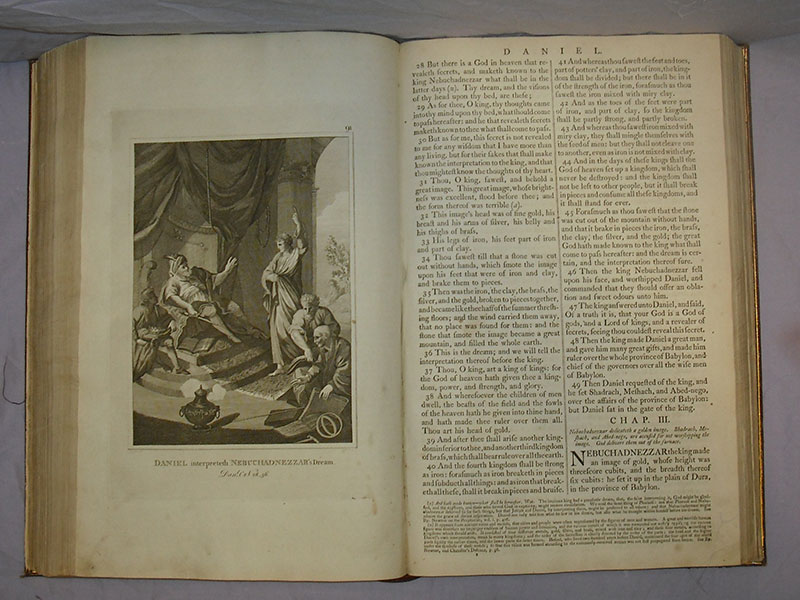
The V.S.L. showing one of the illustrations. Published by G. Swindells of Manchester in 1792.
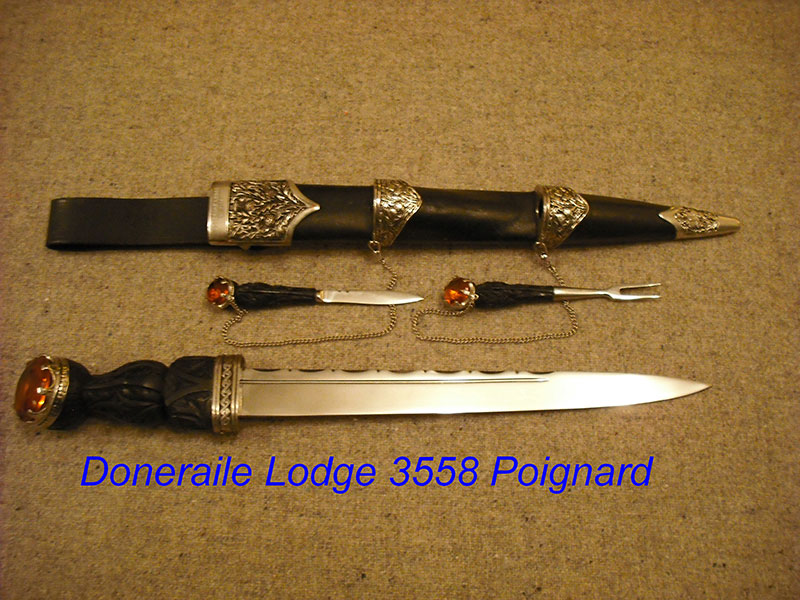
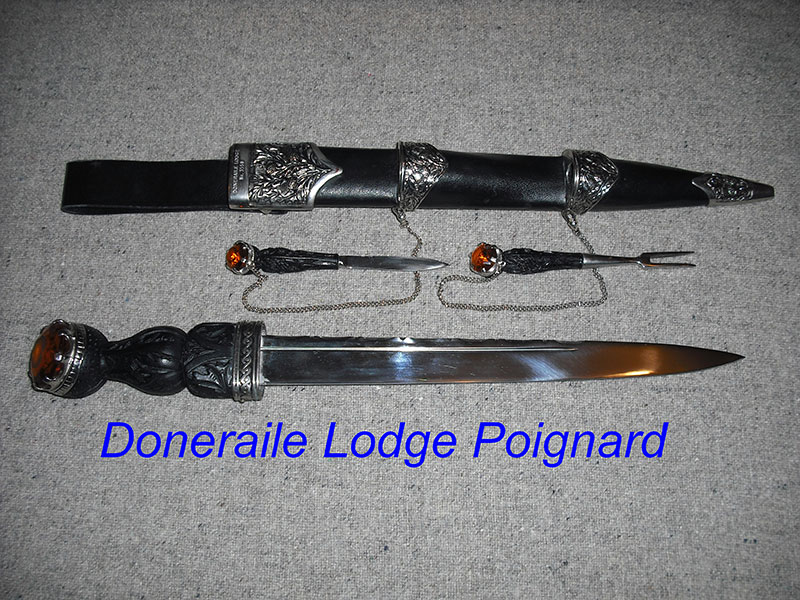
The Lodge Poniard (pronounced - 'poinyard') is a Scottish Skean Dhu. The original was purported to have been carried and used by one of the Lodge Brethren at the Battle of the Somme in 1916. The name of the Brother is not known.
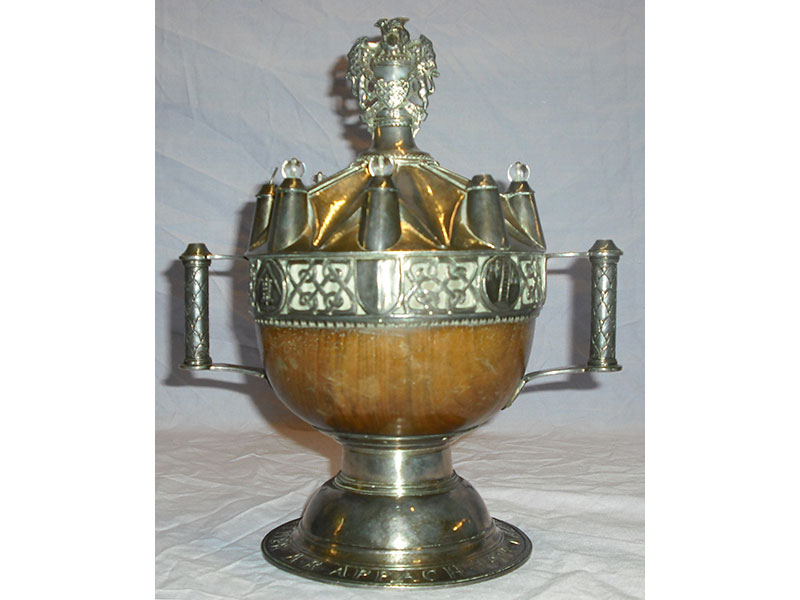
The Alms Bowl is a copy of a very early Alms Bowl. The top and base, crafted in Irish silver, has the Doneraile Arms atop. The wood is from a tree that once grew on Lord Doneraile’s estate in Ireland. Embossed around the outer rim of the base is; “Presented by Bro. A.R. Appach – 1915.”
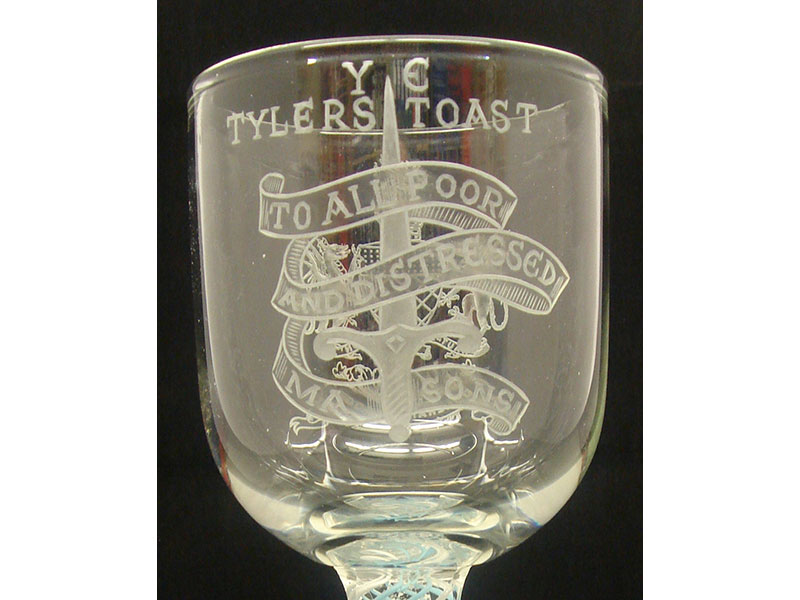
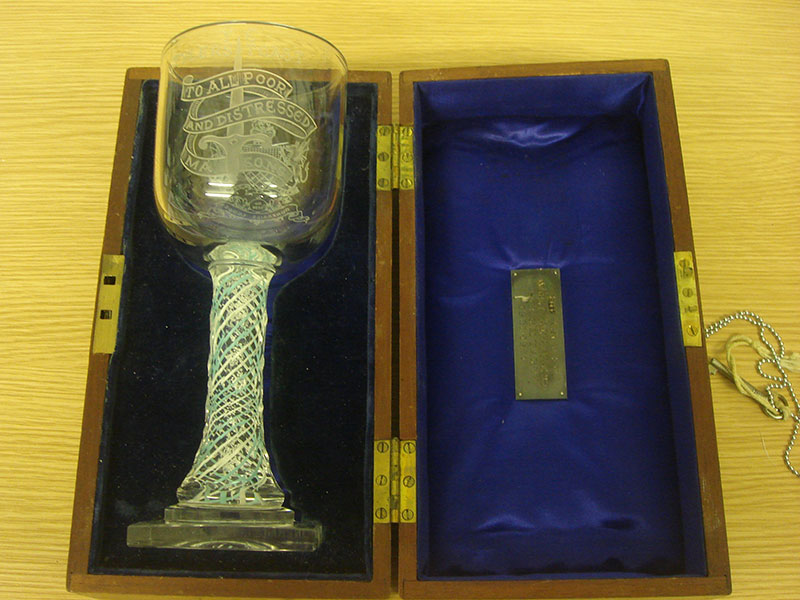
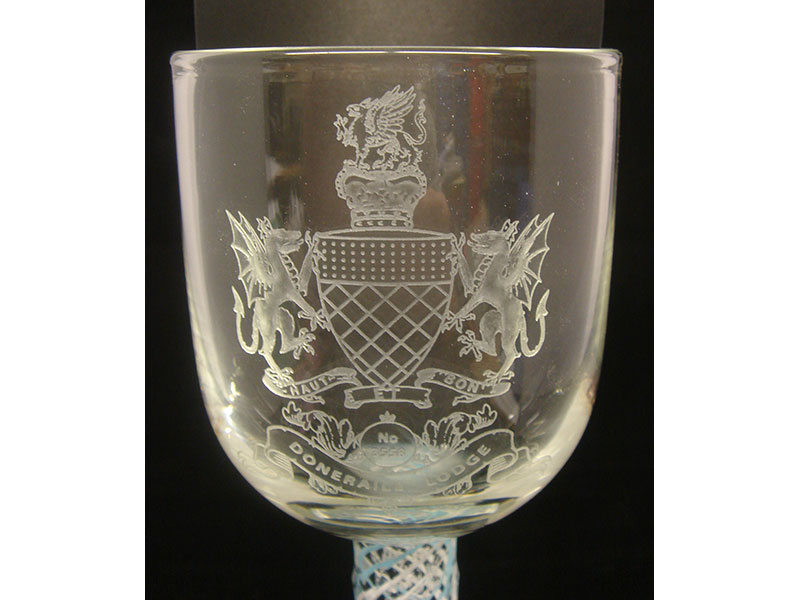
The Goblet is used at Festive Boards by the Worshipful Master and was presented to the Lodge by Bro. A. R. Appach. It has “Ye Tyler's Toast” engraved on the bowl one side and on the other, the Lodge emblem and ‘Doneraile Lodge’ on the stem base.
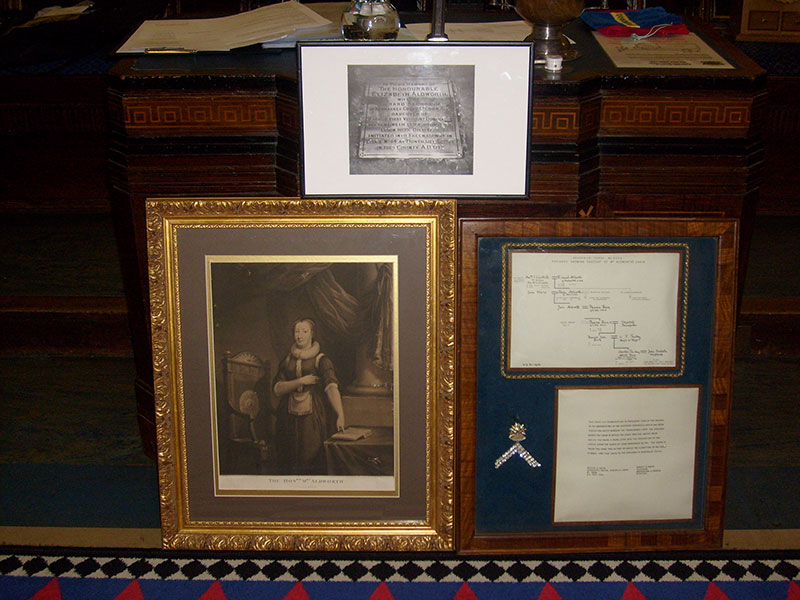
Top Centre:
Photograph of the Memorial Tablet to the Rt. Hon. Lady Aldworth in St. Finbarre's Cathedral, Cork. It reads – "In pious memory of the Honourable ELIZABETH ALDWORTH wife of Richard Aldworth of Newmarket Court, Co. Cork, Esq. Daughter of Arthur, First Viscount Doneraile, Born 1695, Died 1775. Initiated into Masonry in Lodge No. 44 at Doneraile Court A.D. 1712."
Bottom Left Frame:
Picture of the Hon. Mrs. Aldworth, 1695-1775 who was initiated into Lodge No. 44 at Doneraile Court, Co. Cork in 1712 and was later installed as Worshipful Master.
Bottom Right Frame:
The inscription at the bottom reads: "This chart is a transcription in permanent form of the original in hand writing of the Viscount Doneraile, which has been placed for safety beneath the transcribed copy. The original chart, the chain of office, the jewel and the wood from which the frame is made came into the possession of the Lodge upon the death of Lord Doneraile in 1941. The wood is from the same tree as that of which the (other) furniture of the lodge is made – one that grew in the grounds of Doneraile Castle."
